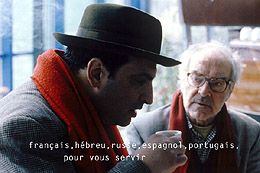A meditation on life, centred around the reality of violence. Hell is war. Purgatory is where we are, with all our questions of the meaning of it all. The Egyptian poet as himself recites his poetry ( below ) and Godard as himself talks about reality and illusion. And guess what, there is a heaven!
A hard to figure but easy to enjoy visual-tonal-verbal-intellectual essay on the plight of humanity. The elegant fusion of words, images and music makes for a delectable repast. Let's once and for all get over the stone age myth that a movie is a story. Stories are tedious. A film is an instrument of transformation.
From the film
From the film
Mahmoud Darwich, the poet
their own story
inherit the earth of those words.
There is no more room left for Homer.
You try to be the Trojan's poet.
Euripides was Greek.
Troy never told its story.
Does a people or a country
that has great poets
have the right to defeat
a people that doesn´t have poets?
Can a people be strong
without writing poetry?
If they defeat us in poetry we are done for....
Heisenberg and Bohr were waIking through Denmark´s countryside.They pass by the castIe of EIsinore.The German savant says, ´That castle has nothing extraordinary about it". The Danish physicist repIies,"Yes, but if you say, ´Hamlet ´s castIe´, then it becomes extraordinary."
EIsinore: the real. Hamlet: the imaginary.
Imaginary: certainty. Real: uncertainty.
The principIe of moviemaking: to take the light...and shine it upon our night
Olga, the Russian Jewish emigre woman:
Two things give me pause...one very small, another very big.
But the small one is aIso big.
What ´s the small one?
Suffering.
Suffering?
Could it be so important? Is it be possible to kill without suffering?
And the second reason, the big one?
The other world.
Punishment, you mean?
That doesn´t matter.
The other world,simply the other world.
You think there is anyone who doesn´t think about the other world?
Everyone can onIy judge for themselves.
Freedom will only be total when living or dying is indifferent
Everything boils down to the individual human being. Everyone shares culpability.
Everything boils down to the individual human being. Everyone shares culpability.
Olga blows herself up and sure enough, this other world, paradiso, where she finds herself sharing an apple, is all greenery and streams, guarded by US marines. Honestly, even without the marines, Godard at his advanced age, has a rather bleak vision of the world to be. He could at least have equipped heaven with internet, movies, and books. How long can you look at greenery or subsist on apples?





